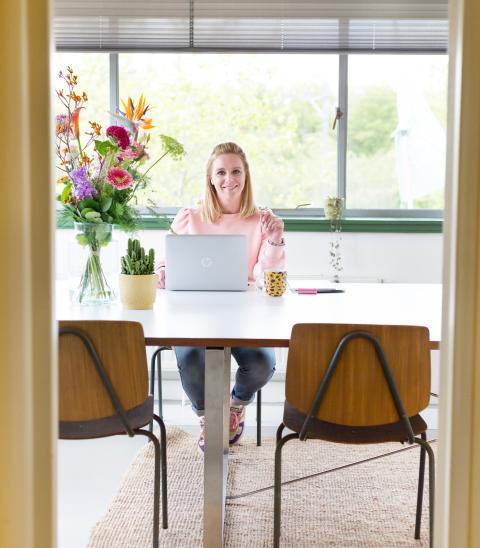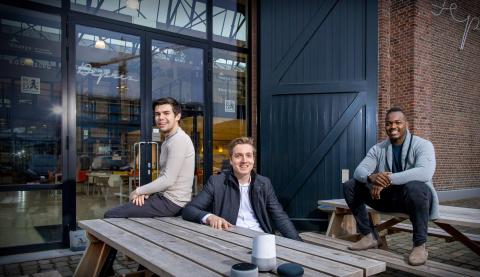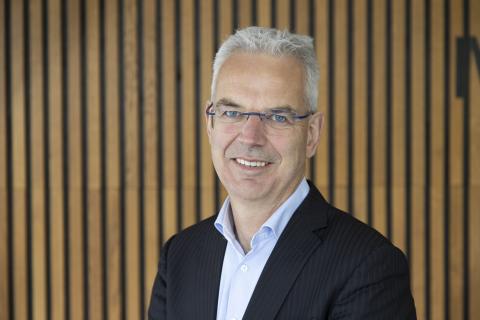How Tilburg University is embracing entrepreneurship
With a Bachelor’s program that started in 2020 and inclusion in the institution’s educational profile, Tilburg University is embracing entrepreneurship. These innovations are closely aligned with social trends. “Increasing numbers of students but also researchers see entrepreneurship as a way of expressing their social commitment.”
An education geared to government, science and the corporate world. That’s what the university was known for up until about twenty years ago. Whoever studied here was promised a career in a big organization. Even though small and medium-sized businesses are great places for people with a university degree, in the opinion of alumna Miriam Swaans, who owns and runs the agency Swaans Communicatie. In retrospect she would have liked it if there had been more attention to the skills you need for entrepreneurship, for example, in her degree program. “As an entrepreneur that would give you a head start compared to people who have to learn it mostly by trial and error.”

The shutters have been thrown open
Alumna Miriam Swaans - owner agency Swaans Communicatie
Swaans graduated in Communication and Information Sciences in 2004. She combined her academic education with freelance copy writing for businesses. It’s her impression that, at the time, there was a large gap between the theoretical scholarly world and actual practice. “The focus of my course work in communication studies was inspiring because of the passion for texts. But with the exception of two instructors, it was quite inwardly focused.” Now she sees a different institution. “The shutters have been thrown open.” She cites the project “The New Common,” where Tilburg academics suggest ways of thinking about a new future after Covid-19, as a good example.
Into high gear
The entrepreneurial Swaans actually attended Tilburg University a bit too early. Shortly after her graduation entrepreneurship started to receive more attention. That’s when support for business people really shifted into high gear. It all started with the Incubator fifteen years ago, when it became possible for student entrepreneurs to have their own place at the university and exchange views there with others who had the same kind of dreams. This gave the starting shot for increased support.

Our student startups can then tap into an extensive network of lawyers, financing experts and alumni who can act as coaches
Edward van de Pol - Director of the Knowledge Transfer Office
Edward van de Pol, Director of the Knowledge Transfer Office at Tilburg University, has witnessed the shift in the last ten years. Generously supported coaching for student entrepreneurs got off the ground with Starterslift, where Van de Pol started out. That support was later expanded in Braventure and IQONIC. Currently, student entrepreneurs get all the help they need in setting up their own companies, establishing contacts and financing. The journey always starts with the business developers of IQONIC. Student entrepreneurs meet with one of these developers to discuss their needs. From there they are often referred to specialists who can offer help in specific fields of interest. Van de Pol: “Our student startups can then tap into an extensive network of lawyers, financing experts and alumni who can act as coaches. There is also a possibility to receive early phase financing via a pre-seed fund.”
Springboard
Lots of entrepreneurs are profiting from the favorable new “entrepreneurial climate” at Tilburg. Like alumnus Luuk van Hoogstraten of Genius Voice, a startup that helps companies in setting up voice technology online. Van Hoogstraten started his company together with his friends and fellow students Dylan Mattijssen and Jason Oleana while enrolled in the Marketing Analytics program. They worked on it together at the Incubator in the Intermezzo building. Van Hoogstraten: “The big advantage of combining studying and starting a business is that you can start your job as soon as you graduate. But it isn’t easy. We were totally stressed out.”
From left to right: Luuk van Hoogstraten, Jason Oleana and Dylan Mattijssen

Questions sharpened our focus and saved us from making unnecessary mistakes
Alumnus Luuk van Hoogstraten - Genius Voice
They got a lot out of the advice of the business developers of IQONIC in starting up their business. “Karen Lanning asked us a bunch of critical questions. The advisers she put us in touch with did the same thing. Those questions sharpened our focus and saved us from making unnecessary mistakes. Something else that has been really useful, and still is, is the university’s network. When you’re a student, the circle of people you know is still very small. But practically every month we would meet new people with experience through IQONIC, Braventure and Mindlabs.” They provided not only advice but also opportunities. For instance, the Tilburg graduates found their first big client through the university’s network. “An academic researcher in Rotterdam who is going to use a chatbot for online research.” Van Hoogstraten hopes that students will increasingly see the university as a springboard for starting up a business.
First academic program in entrepreneurship
There’s a bigger chance that Tilburg University will produce more entrepreneurs since the year 2020. That’s when we initiated the Bachelor’s program in Entrepreneurship and Business Innovation. It’s the first academic program in the Netherlands that is completely focused on starting a new business and corporate entrepreneurship. According to the driving force Geert Duijsters, Dean of Tilburg School of Economics and Management, this shows how Tilburg University is in step with current ways of thinking. “In the Netherlands we have 2.1 million businesses, a number that is growing each year by a factor of about 100,000. It’s not something that, as a university, you can ignore anymore.” That the university had a good feel for an untapped student need is demonstrated by the enormous interest students have in the new Bachelor’s program. Duijsters: “At the beginning we assumed about 50 applications, but we received five times that number, a full 250. This year we grew to 300 students.”
Duijsters sees the explanation for the popularity of entrepreneurship in the current challenges we face today. The climate problem and biodiversity crisis demand entrepreneurs who have the courage to do things differently. “Increasing numbers of students and also researchers see entrepreneurship as a way of expressing their social commitment.” The specialization in Social & Environmental Entrepreneurship within this Bachelor’s program is extremely popular, Duijsters points out. “Compared to previous generations, the focus of young entrepreneurs is less on making a profit and more on making a contribution to society.” The chance is bigger that you will be able to make a significant contribution through a startup than at an established company, Duijsters believes. “Established big companies are slow in becoming more sustainable. They often benefit by having a head start, which makes them less liable to start doing things completely differently.”

Entrepreneurship as a way of expressing their social commitment
Geert Duijsters - Dean of Tilburg School of Economics and Management
New academic discipline
The Bachelor’s program will contribute to more thriving businesses, Duijsters expects. As he says, research shows that entrepreneurs with a higher education are more successful. “Moreover, by teaching them the basics of bookkeeping, taxation, marketing and business models, you prevent unnecessary bankruptcies and insolvencies.” What is actually the difference between the new program and Business Administration, which also trains students in these fields? According to Duijsters, this Bachelor’s program is clearly differentiated in terms of the knowledge it offers. “In Business Administration you work with concepts and data that apply to big companies. It offers little for those who want pursue a startup or SME. Marketing and financing for people working on a smaller scale are totally different than for someone who performs such work for Philips.”
Duijsters has found that it is quite difficult to attract qualified researchers and lecturers. “It’s only in the past twenty years that entrepreneurship has really developed into an academic discipline. It’s hard to find people in this area who have been doing research for a long time or who are long-time PhD graduates in the field.” Something that helped attract people, according to Duijsters, is that this is the first program of its kind. The level of enthusiasm among the students is also a plus. “You won’t find a more active student community anywhere.” Our students are really eager to get out there and do something with all the things they’ve learned. After a class I get around forty emails, that’s many times more than in other fields of study. Despite Covid-19, the contact between the students is quite intense, Duijsters says. “Initially that was obviously digital, but now they are also getting together at our meeting hub. They sit there sometimes until eleven o’clock in the evening working out their ideas together.”
Duijsters thinks it’s nice to see how the Bachelor’s program is giving new impetus to the dynamic on campus. Moreover, Tilburg University can gain a lot of inspiration from the growing body of knowledge about entrepreneurship. “In order to be more innovative, companies are setting up and housing new activities in separate ‘ventures.’ This is something that the university could also be doing: setting up ventures that develop new forms of digital education. You could even do that collaboratively with other organizations.”
You have to be able to see opportunities, have the courage to go out into the world and be good at selling your story
Selling your story
The university’s support for entrepreneurship is furthermore not limited to student entrepreneurs. Researchers are also receiving support in entrepreneurship. This fits with the university’s ambition of making its scientific knowledge socially relevant. Social relevance is the third core function of Dutch universities. According to Van de Pol, entrepreneurial skills help with such things as expanding the impact of scientific research. “Just as for business people, increasing numbers of researchers feel a need to have a positive impact on society. We assist interested researchers in learning the necessary skills and finding the contacts they need to accomplish this.”
When they need support they can turn to people like business developer Dirk van den Berg of IQONIC, who’s also involved in the Impact Program at Tilburg University. This has produced some nice examples. Like social psychologist Andrea Rozema. In 2020 she won the Tilburg University Impact Award for her project Don’t light up at school (Op school steek je niets op). She used her research results to convince politicians to adopt legislation making school grounds smoke free. Van de Pol: “In order to have social impact, researchers have to have entrepreneurial skills. You have to be able to see opportunities, have the courage to go out into the world and be good at selling your story.”
Academia cannot sidestep entrepreneurship any longer
When looked at this way, entrepreneurial skills are actually important for everybody. Which is one of the reasons that entrepreneurship has been adopted within Tilburg’s educational profile. It’s now going to be hard to find someone who says that the university isn’t paying enough attention to entrepreneurship.
Organizations for entrepreneurship
- IQONIC. This program supports students, alumni, academics and other staff, as well as organizing workshops and other events dealing with entrepreneurship. It brings together all Tilburg University’s activities in the area of entrepreneurship.
- Academic Business Club, Asset and Enactus. Study associations for entrepreneurial students. They organize events on entrepreneurship.
- Braventure. Regional network for the startups of six educational institutions, including Tilburg University, and the same number of development companies.
- Station 88. Clubhouse for all entrepreneurs in the region of Midden-Brabant. It offers workshops and coaching for entrepreneurs, including student entrepreneurs. Tilburg University is one of the founding partners.
Events on entrepreneurship
This year the university is organizing a whole host of events dealing with entrepreneurship. Here’s a selection:
- Monthly entrepreneurship day, with activities such as Venture Visionaries and Expert Hour. Venture Visionaries is an inspiration session with a successful and well-known entrepreneur/business. During the Expert Hour, student entrepreneurs can put questions about a specific topic to experts from the business world.
- Tilburg University Challenge. An annual competition for entrepreneurs, with workshops, a wide range of coaches from the business world and an interesting package of prizes. Various events, from Kick Off through Finals.
- Global Entrepreneurship Week. The university’s contribution will be various events for students, lecturers, academics, staff and alumni.
Date of publication: 21 September 2021
